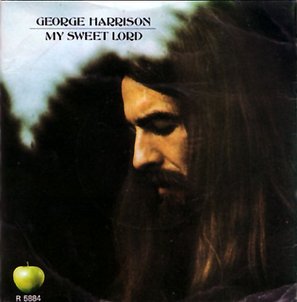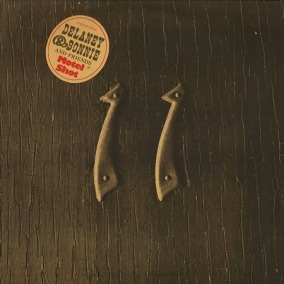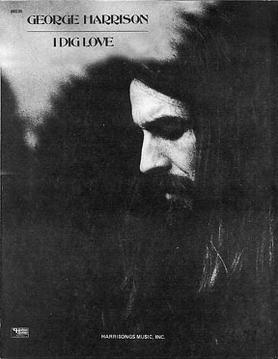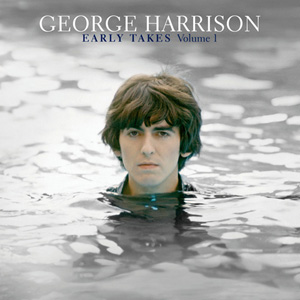
Derek and the Dominos were a short-lived English–American blues rock band formed in the spring of 1970 by singer-guitarist Eric Clapton, keyboardist-singer Bobby Whitlock, bassist Carl Radle and drummer Jim Gordon. All four members had previously played together in Delaney & Bonnie and Friends, during and after Clapton's brief tenure with Blind Faith. Dave Mason supplied additional lead guitar on early studio sessions and played at their first live gig. Another participant at their first session as a band was George Harrison, the recording for whose album All Things Must Pass marked the formation of Derek and the Dominos.

Thirty Three & 1⁄3 is the seventh studio album by English musician George Harrison, released in November 1976. It was Harrison's first album release on his Dark Horse record label, the worldwide distribution for which changed from A&M Records to Warner Bros. as a result of his late delivery of the album's master tapes. Among other misfortunes affecting its creation, Harrison suffered hepatitis midway through recording, and the copyright infringement suit regarding his 1970–71 hit song "My Sweet Lord" was decided in favour of the plaintiff, Bright Tunes Music. The album contains the US top 30 singles "This Song" – Harrison's satire on that lawsuit and the notion of plagiarism in pop music – and "Crackerbox Palace". Despite the problems associated with the album, many music critics recognised Thirty Three & 1⁄3 as a return to form for Harrison after his poorly received work during 1974–75, and considered it his strongest collection of songs since 1970's acclaimed All Things Must Pass.

"My Sweet Lord" is a song by English musician George Harrison, released in November 1970 on his triple album All Things Must Pass. It was also released as a single, Harrison's first as a solo artist, and topped charts worldwide; it was the biggest-selling single of 1971 in the UK. In America and Britain, the song was the first number-one single by an ex-Beatle. Harrison originally gave the song to his fellow Apple Records artist Billy Preston to record; this version, which Harrison co-produced, appeared on Preston's Encouraging Words album in September 1970.

Delaney & Bonnie were an American duo of singer-songwriters Delaney Bramlett and Bonnie Bramlett. In 1969 and 1970, they fronted a rock/soul ensemble, Delaney & Bonnie and Friends, whose members at different times included Duane Allman, Gregg Allman, Eric Clapton, George Harrison, Leon Russell, Bobby Whitlock, Dave Mason, Steve Howe, Rita Coolidge, and King Curtis.

"After Midnight" is a rock song by J. J. Cale, first released in 1966. Eric Clapton later covered it for his eponymous album, released in 1970. Clapton's rendition became a success, prompting Cale to re-record the song for his own 1971 album Naturally. In 1987, Clapton later re-recorded the song for a Michelob beer commercial and then released the re-recording as a single. "After Midnight" has been considered one of Clapton's signature songs throughout his career. Other artists covered the song in later years.

Encouraging Words is the fifth studio album by American soul musician Billy Preston, released in September 1970 on Apple Records. It was the last of Preston's two albums for the Beatles' Apple label, after which he moved to A&M Records. The album was co-produced by George Harrison and Preston. Harrison's songs "All Things Must Pass" and "My Sweet Lord" were issued here for the first time, two months before his own recordings appeared on his triple album All Things Must Pass.

On Tour with Eric Clapton is a 1970 album by Delaney & Bonnie with Eric Clapton, recorded live at the Fairfield Halls, England. Released on Atco Records, it peaked at No. 29 on the Billboard 200 in April 1970, at No. 39 on the UK Albums Chart, and was certified a gold record by the RIAA.

"Crackerbox Palace" is the ninth track on George Harrison's 1976 album, Thirty Three & 1/3. The song was released as the second single from the album and reached number 19 in the American pop charts.
"Don't Let Me Wait Too Long" is a song by English rock musician George Harrison, released on his 1973 album Living in the Material World. It was scheduled to be issued as a single in September that year, as the follow-up to "Give Me Love ", but the release was cancelled. Music critics have traditionally viewed "Don't Let Me Wait Too Long" as a highlight of the Material World album, praising its pop qualities and production, with some considering the song worthy of hit status.
"Sue Me, Sue You Blues" is a song written by English musician George Harrison, released on his 1973 album Living in the Material World. Harrison initially let American guitarist Jesse Ed Davis record it for the latter's Ululu album (1972), in gratitude to Davis for his participation in the Concert for Bangladesh. When writing the song, Harrison drew inspiration from the legal issues surrounding the Beatles during the early months of 1971, particularly the lawsuit that Paul McCartney initiated in an effort to dissolve the band's business partnership, Apple Corps.

Motel Shot is a studio album by Delaney & Bonnie and Friends, released in 1971. The album, their third for Atco/Atlantic and fifth overall, is a mostly acoustic set. The album's title refers to the impromptu, sometimes late-night, jam sessions pursued by touring musicians when on the road.

The Original Delaney & Bonnie, also known by its subtitle Accept No Substitute, is the second studio album by American recording duo Delaney & Bonnie. It was recorded with many of the "friends" that would form the core of their best-known 1969–70 touring band, including Bobby Whitlock, Carl Radle and Rita Coolidge.

Delaine Alvin "Delaney" Bramlett was an American singer and guitarist. He was best known for his musical partnership with his wife Bonnie Bramlett in the band Delaney & Bonnie and Friends, which included a wide variety of other musicians, many of whom were successful in other contexts.

Stories We Could Tell: The RCA Years is a country rock compilation album by The Everly Brothers, released in 2003. The original LP Stories We Could Tell was produced by Paul Rothchild and released by RCA Victor in 1972. This CD contains the original album plus eight of the twelve tracks from the Everlys' other RCA album, Pass the Chicken & Listen.

Bobby Whitlock is the debut solo album by American songwriter and rock musician Bobby Whitlock, released in early 1972. The album features all of the former members of Derek and the Dominos – Whitlock, Eric Clapton, Carl Radle and Jim Gordon – although never all together. Other contributors include George Harrison, the sessions for whose 1970 triple album All Things Must Pass had led to the formation of the Dominos; Delaney and Bonnie Bramlett; and ex-Manfred Mann bassist Klaus Voormann.

"I Dig Love" is a song by English rock musician George Harrison from his 1970 triple album All Things Must Pass. A paean to free love, it marks a departure from the more profound, spiritually oriented subject matter of much of that album. Musically, the song reflects Harrison's early experimentation with slide guitar, a technique that he was introduced to while touring with Delaney & Bonnie and Friends in December 1969.

"Māya Love" is a song by English musician George Harrison, released on his 1974 album Dark Horse. The song originated as a slide guitar tune, to which Harrison later added lyrics relating to the illusory nature of love – maya being a Sanskrit term for "illusion", or "that which is not". Harrison's biographers consider the lyrical theme to be reflective of his failed marriage to Pattie Boyd, who left him for his friend Eric Clapton shortly before the words were written. Harrison recorded the song at his home, Friar Park, on the eve of his North American tour with Ravi Shankar, which took place in November and December 1974. The recording features Harrison's slide guitar extensively and contributions from four musicians who formed the nucleus of his tour band: Billy Preston, Tom Scott, Willie Weeks and Andy Newmark. Reviewers note the track as an example of its parent album's more diverse musical genres, namely funk and rhythm and blues, compared with the more traditional rock orientation of Harrison's earlier solo work.

Early Takes: Volume 1 is a compilation album of outtakes and demo recordings by English rock musician George Harrison, released posthumously on 1 May 2012. The recordings appeared in Martin Scorsese's 2011 documentary film George Harrison: Living in the Material World and were originally issued as part of the deluxe version of the DVD release. Producer Giles Martin compiled the album, working with engineer Paul Hicks. The majority of the tracks date from the sessions for Harrison's 1970 triple album All Things Must Pass.

Doris Troy is an album released in 1970 on the Beatles' Apple Records label by American soul singer Doris Troy. It features songs written by Troy and a number of the participants on the sessions, including George Harrison, Stephen Stills, Klaus Voormann and Ringo Starr. Through the extended period of recording, the album became an all-star collaborative effort, typical of many Apple projects during 1968–70, although it was Troy's only album on the Beatles' label. Other guest musicians included Billy Preston, Peter Frampton, Leon Russell, Eric Clapton and members of the Delaney & Bonnie Friends band. Like the Harrison-produced single "Ain't That Cute", Doris Troy failed to chart in Britain or America on release.
















